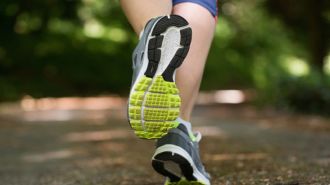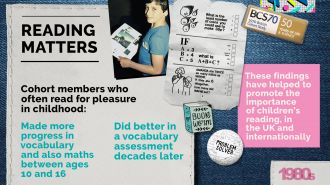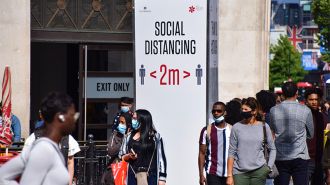
- Our studies
- Our research
- Publications and resources
- Data access and training
- About
- News
- Events
- Get in touch
- Join our mailing list

Welcome to our news and blogs section. Here you’ll find the latest developments and insights from across our longitudinal studies.
Data from the 1970 British Cohort Study (BCS70) Age 51 Sweep are now available to download from the UK Data Service.

A new, searchable, online guide on physical activity measures used in six longitudinal studies, including the 1958, 1970 and Millennium birth cohorts, has been launched by CLOSER.

Celebrating 50 years of the 1970 British Cohort Study – The 1970 British Cohort Study highlighted how periods of being out of education, employment or training after leaving school can impact on young people’s lives
As part of our celebration of 50 years of the 1970 British Cohort Study (BCS70), we hosted a live panel that looked at the huge impact of the study on policy in the UK. From social mobility to adult numeracy and health outcomes, how has it influenced policy-makers now and how can it contribute in […]

Celebrating 50 years of the 1970 British Cohort Study – The Age 26 Sweep was the first adult follow-up of BCS70, and over 9,000 cohort members took part.

Celebrating 50 years of the 1970 British Cohort Study – With five decades of invaluable service to British science and society, what has it been like for our 1970 British Cohort Study members to take part in the study? This week we speak to Gillian.

Celebrating 50 years of the 1970 British Cohort Study – BCS70 findings on adult numeracy and literacy helped to kickstart a series of government education initiatives that would improve the basic skills of millions of British adults during the 2000s.

Celebrating 50 years of the 1970 British Cohort Study – The Age 21 Sub Study was conducted with a 10% representative sample of cohort members from across Britain. It collected valuable information about levels of literacy and numeracy among young adults in Britain.
The UCL Centre for Longitudinal Studies (CLS) is seeking views on the questions to include in the next wave of its COVID-19 survey, due to take place in early 2021.

Celebrating 50 years of the 1970 British Cohort Study – With five decades of invaluable service to British science and society, what has it been like for our 1970 British Cohort Study members to take part in the study? This week we speak to Claire.

Celebrating 50 years of the 1970 British Cohort Study – Cohort members who had often read for pleasure made more progress in English, but also in maths, between the ages of 10 and 16, compared to those who had rarely read.

The Centre for Longitudinal Studies (CLS) has secured funding from the Economic and Social Research Council (ESRC), to further its investigation into the immediate and longer term impacts of the COVID-19 pandemic on people in Britain.

Celebrating 50 years of the 1970 British Cohort Study – During the Age 16 Sweep study members were given a 4-day dietary diary to complete. Analysed alongside dietary data from later sweeps, this information may help us to understand adult eating patterns, and health outcomes such as obesity and diabetes.
Ryan Bradshaw
Senior Communications Officer
Phone: 020 7612 6516
Email: r.bradshaw@ucl.ac.uk